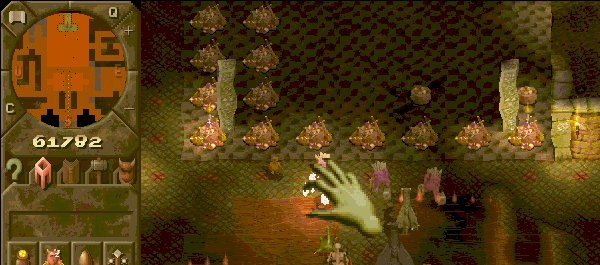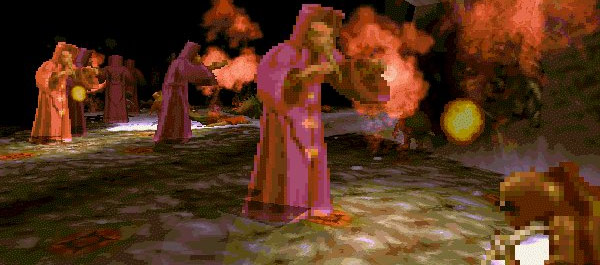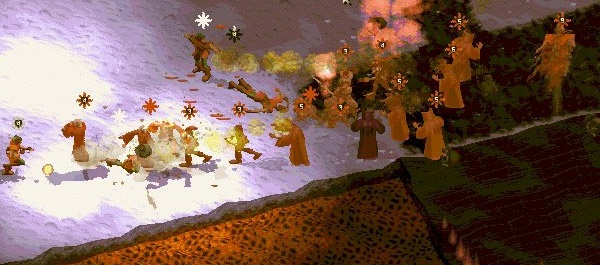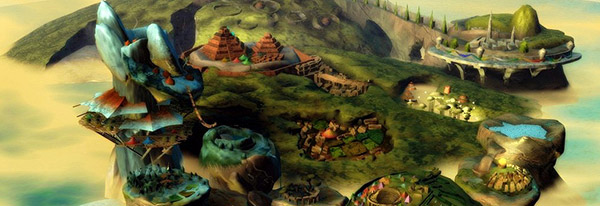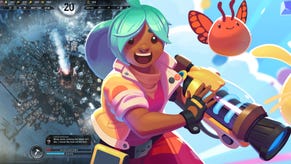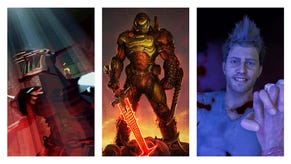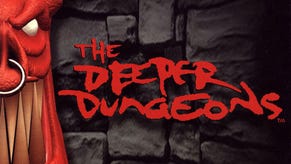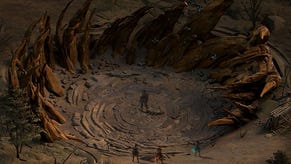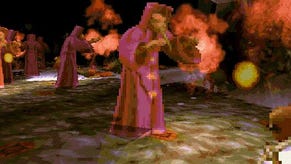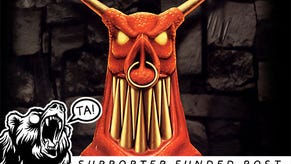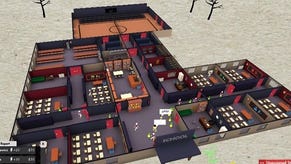Retro: Dungeon Keeper
Often mis-described as a management title, Bullfrog’s last game before collapsing into a mess of sequels (and eventual death) is much closer to real-time strategy. You build a base, harvest resources and train an army. The same old song. The difference is this is an RTS that fights against you, that actively resists your feeble attempts to control it. It’s like driving a car with three wheels, no suspension and a crazy shouting hobo in the passenger seat. It is entirely unwilling, and it’ll take any opportunity to steer itself onto the pavement and mow down a few dozen pedestrians. That is, of course, the charm of Dungeon Keeper.
For all its aggressive marketing about being evil, mustering the forces of darkness against the sickening purity of goodly mankind, really this was nothing more than Mad Magazine does Mordor. Instead, DK is about bitterness and discontent, about making the best of a bad hand. (There's a gag in there, somewhere).
You can’t entirely control which monsters join your dungeon, so the army you field is the army you’re given. You can’t entirely control where your army goes – deposit your grumbling troops on battle frontlines, and there’s a strong chance they’ll just turn around and wander off home. You can’t entirely control what traps and doors your Bile Demons and Trolls build. You can’t entirely control whether your army trains itself up to level 10 or not, so the fighting-fit force you though you had ready turns out to be a cartel of puny, overfed nothings.
You can’t even entirely control your Imps, magical slaves that wouldn’t even exist if it weren’t for your life-granting hand. Some twisted wiring in their tiny walnut brains means that even dropping them directly in front in the tunnel you want dug can’t stop them running halfway across the map to some more minor objective, and usually straight into the arms (and teeth, claws and fireballs) of the enemy.
Most of all, you can’t control the Horned Reaper. My most recent return to Dungeon Keeper, a game I’ve gladly revisited in most years since its 1997 release, saw me constructing an entire secondary dungeon soley for this most fearsome of DK’s denizens. Unexpectedly seized by uncontrollable rage, keeping him in genpop meant certain death for the rest of my precious horde. But Horny is too powerful an asset to dispose of for the trifling matter of mass fratricide. And so I dilgently set aside a second fortress, just for him – a bed, food and a treasure room. His rage never dimmed – and no doubt was heightened by this lonely prison of luxury – but he was there when I needed him. The ultimate weapon to let loose upon intruders, regardless that'd he'd unthinkingly take his scythe to any of my other creatures that stumbled into the fray. Horny's a nutter, but he's my nutter.
All these unhelpful helpers, all these deliberate obstacles, make triumph in DK an enormously satisfying thing: you’ve rolled with its weird punches. More conventional strategy simply bombards you with impossible odds until sheer reflex and hotkey memorisation wins the day. There’s much less mechanical challenge to DK – it’s built upon a fairly simple set of rules, and never approaches the heights of frenetic attention-seeking of a Starcraft or Supreme Commander - but there is that sense of being a king stood masterfully atop a shifting sea of chaos. Your subjects hate you as much as the enemy hates you. No-one wants you to win but you. You go, you.
So much of DK’s violence and economy, the staples of RTS, happens regardless of you. Somehow, this seems more involving than the usual rigmarole of go exactly there, build exactly here. In the middle of a towering inferno, you’re the guy rushing around with a tiny fire extinguisher. It shouldn’t work, but it does. Battles seem to be incomprehensible screaming carnage, but really they involve complex decision-making. Cast electro-zap spell here, pull wounded Troll out there, drop level 2 Warlock in there (and hope for the best), lock door here to keep helpless imps from straying into the crossfire... Dungeon Keeper is glorious panic, but, with its neatly-ordered underground lairs and single-minded purpose, is so much more focused than its spiritual sequel Black & White.
Much as I may adore it though, Dungeon Keeper just isn’t cool. There’s a nerdiness to its humour – it’s all silly-voiced high fantasy pastiche rather than having anything smart and subversive to say about this most-overused of gaming universes. That’s why it’s not thought of with anywhere near the same reverence as Bullfrog’s earlier strategy experiment, Syndicate.
DK didn’t hitch a ride on some timely cyberpunk bandwagon, it didn’t do much to offend even the most highly-strung parent and it certainly, for all its heavy-handed marketing campaign, didn’t much live up to its high concept of being the evil guy. PG-13 nods to S&M was as twisted as DK got. So, it’s easily considered a safe experiment for Bullfrog. Placing rooms and building armies – this was Bullfrog as Bullfrog does, notably one of their first games since being subsumed into EA’s cold-eyed mass, and their last to involve Peter Molyneux. Post-DK, Bullfrog’s path would be one of sequels and collapse.
On the other hand, it was the last great roar of a giant, just before he had his legs chopped off. I think of it in the same breath as X-COM, which is doubtless enough to draw gasps of horror from some. It doesn’t come close to either the tightness or the fullness of Julian Gollop’s masterwork, but, to teenage me then and to adult me now, it seems its equal for sense of place. Silly but not too silly, characterful without quite submitting to stereotype, it felt like a fully-realised world in the same way that first X-COM did.
Dungeon Keeper’s a game I can always go back to, a place that’s totally familiar, and one of those games I can’t entirely unhook from base nostalgia. If I seem a little maudlin about it, that’s why – I can’t seem to find that one great, perfect argument to make for it, to identify some gosh-wow element, obvious or otherwise, to sell it to those who didn’t play or didn't respect it. I can only write a silly little love letter to it.
[Should you wish to revisit it and are able to locate a copy, I can attest to Dungeon Keeper still functioning just fine in Windows Vista (though not the 64-bit version) with Win 2000 compatibility mode turned on, bar a mucky colour issue which is fixed by alt-tabbing out and then back in again.]


